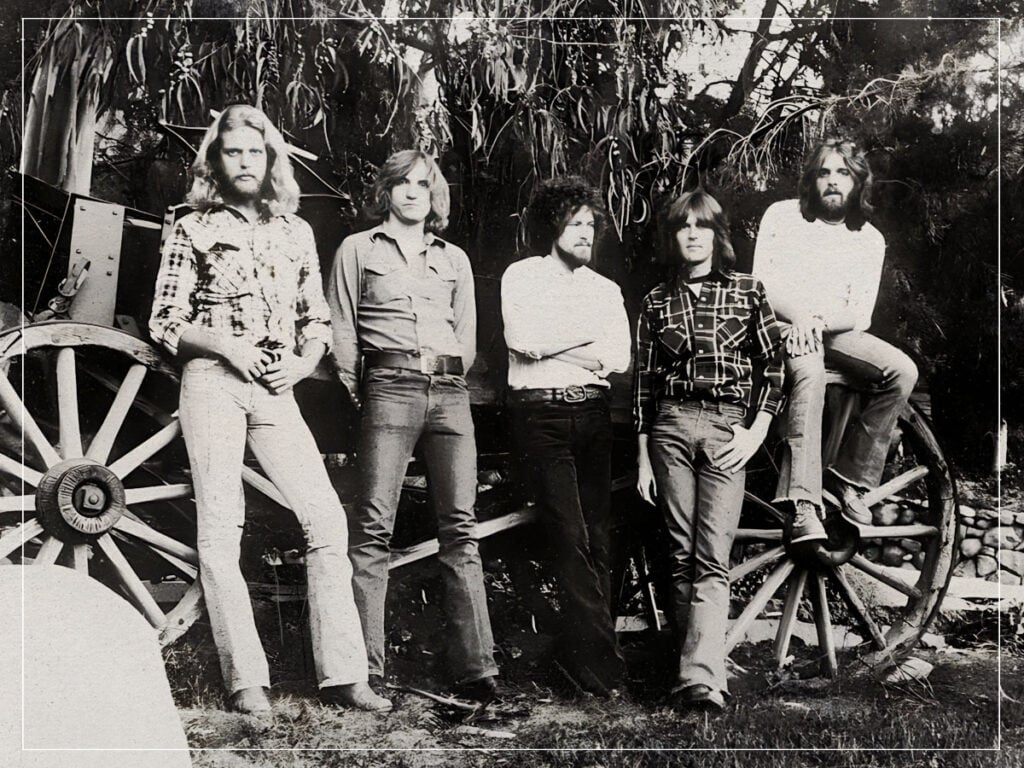
(Credits: Showtime / The Eagles)
Wed 19 November 2025 19:11, UK
Before the release of their second single, ‘Witchy Woman’, the Eagles, and Don Henley in particular, had to prove themselves as songwriters. Then came this slinking, sultry number, carried over from guitarist Bernie Leadon’s days in the Flying Burrito Brothers.
The remnant was creditable, but the Eagles were aiming higher. So, Henley endeavoured to take Leadon’s demo and turn it into something altogether more spellbinding. And no, the inspiration powering him on was not Stevie Nicks, even if she has since said she would’ve considered it a major honour.
After Henley had wrestled into something approaching a country rock opus, the track soon strutted its way into the top ten of Billboard’s singles chart and captured the imagination of the aforementioned Stevie Nicks, who was only 24 when it was released in August of 1972, and she was searching out her break as a songwriter.
Henley’s lyrics about a “restless spirit” with “raven hair and ruby lips” seemed to embody the allure of the West Coast for rock fans in the early 1970s, while the group harmonies on the chorus showed just what the Eagles were all about. There was something wild and dark about the song, contrary to the bright guitar jangles and earnest, folksy charm of ‘Take It Easy’, the band’s debut single that Glenn Frey had written with Jackson Browne.
It seems that Henley dreamed up his song’s protagonist as a feverish vision while bed-bound and burning up with a bad case of the flu. She didn’t appear out of nowhere, though. A book he was reading to pass the time, as he recovered, by English author Nancy Mitford, gave him a sense of the character he was writing about.
 The Eagles in all their glory. (Credits: Far Out / Alamy)
The Eagles in all their glory. (Credits: Far Out / Alamy)
Mitford was principally a novelist but was also known for her biographies of some of history’s most romantic figures, including a book about Madame de Pompadour, the mistress of French king Louis XV, and another about the love life of Renaissance man Voltaire. Yet it was Mitford’s story of a more modern romantic icon that captured Henley’s imagination.
Who was the book about, then?
It was Mitford’s 1970 biography of Zelda Fitzgerald, the famed novelist and visual artist whose appearance in American literary circles and troubled marriage to F Scott Fitzgerald in the 1920s captivated the public, that the Eagles songwriter was reading while bedridden. Mitford’s Zelda traces the tragic life of the early 20th century’s archetypal “flapper” girl and femme fatale, from her introduction to future husband Scott in 1918 to her premature death at the age of just 47 when the hospital where she was institutionalised burnt down.
In a 2016 interview about his band’s debut album, Henley remembered learning about how Fitzgerald “drifted in and out of psychiatric hospitals suffering from schizophrenia (or more likely, bipolar disorder), while her husband’s health and career spiralled downward, due to his abuse of alcohol.” The way Mitford portrayed her subject’s struggles with mental illness and its impact on her art and public persona influenced his characterisation of the titular ‘Witchy Woman’.
The song isn’t all about Zelda Fitzgerald, though. Henley has described the title character as “a composite”, of Fitzgerald and “the roommate of a girl” he was going out with at the time. She took an active interest in the occult, practising what he called “white witchcraft” by enacting séances, palm reading, and other mystical rituals. While Henley wasn’t convinced about these practices, he “thought it was charming and seductive” and apparently worthy of writing a song about it.
Henley filled in any lyrical gaps with images of shamanism that he’d taken from the books of Peruvian-American academic Carlos Castaneda. Overall, then, ‘Witchy Woman’ is the generalised characterisation of a wayward seductress with a soft spot for sorcery, more than the portrait of anyone specific.
Nevertheless, no one inspired it more than the woman who had most of American high society under her spell during the Roaring Twenties. He simply took it upon himself to welcome her into the Sordid Seventies.
Related Topics

